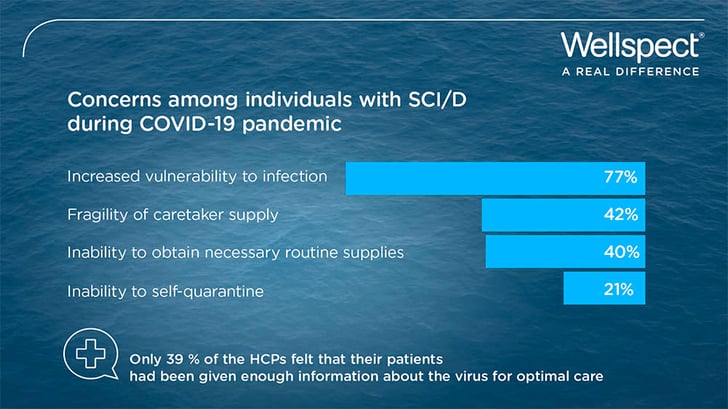This is the first publication that assess the number one concern individuals with spinal cord injury or disorder (SCI/D) may have related to the COVID-19 pandemic. The data spans over six continents and describes the vulnerable situation for these individuals in the pandemic crisis.

The data in this recent publication was collected from an online survey sent via health care professionals (HCPs) working with this patient group, capturing the concerns patients have expressed to their care teams. The survey aimed to investigate how HCPs involved in the care of people with SCI/D are assessing, screening, and treating their patients with potential COVID-19 infections. Data was obtained during the last week of March 2020 and a total of 783 responses were submitted from six continents.
Barriers to testing
Few respondents (5.8 %) had tested their patients for COVID-19 at the time for data collection (March 2020) or reported that they had a patient with the virus, indicating that rehabilitation medicine professionals may not yet have been able to fully engage with the pandemic. This may also relate to a lack of availability of testing, guidelines limiting testing and an under-appreciation of the benefits of routine testing around the world. However, a large number of respondents reported that they had already modified their outpatient practices to reduce their patients’ exposure and this shows that there is an awareness of the need to help protect individuals who may be vulnerable to infection.
There is substantial variability in the rehabilitation medicine community in COVID-19 screening practices and availability of screening kits. People living with SCI/D are expressing legitimate and real concerns about their vulnerability to the current virus. As SCI/D is often associated with need for caregiver support, the regular use of equipment, and vulnerability to pulmonary infection, this subset of individuals requires special planning, attention, and consideration.
From the survey, 22 % of the health care professionals reported that they had not used formal screening guidelines, 9.8 % that they had screened “all outpatients,” and 65.9 % that they had used guidelines published by their government. Less than 5 % of respondents reported that they had diagnosed a SCI/D patient with COVID-19 at the time.
Except from the well-known symptoms from COVID-19 with fever, cough etc, it was reported in the survey that when these patients have also received the virus they show an increased spasticity and rigors. When asked which treatments their patients with SCI/D and COVID had been offered, 83 % replied, “strict isolation/quarantine,” 59 % “emergency room level care/hospitalization,” and 21 % “over the counter medications for symptom relief.”
The health care professionals were also asked in this survey which changes to their practices they were planning or implementing as a result of the COVID-19 pandemic. Increased use of telemedicine was reported by 47 %. These results demonstrate the widespread and rapid implementation of telemedicine around the world which seems to have many advantages including saving travel time, limiting the costs of medical transportation, serving as an environmentally sound form of health care, and limiting the spread of infection to a potentially vulnerable population.
Only 39 % of the health care professionals felt that their patients had been given enough information about the virus for optimal care. The specific questions of concern that the patients have expressed to the HCPs included increased vulnerability to infection (77 %), fragility of caretaker supply (42 %), inability to obtain necessary routine supplies (41 %) and inability to self-quarantine (21 %).
This survey underscores substantial unmet educational needs, both for rehabilitation medicine professionals and for people living with SCI/D. It emphasizes the need for educational tools for patients and professionals such as those recently created by John Shepherd at University of Toronto and available in multiple languages which discuss issues such as maintaining personal equipment and wheelchair hygiene*. In addition, it reveals the specific and legitimate fears experienced by individuals with SCI/D during this pandemic.
*O’Connell C, Eriks-Hoogland I, Middleton J. Now more than ever our community is needed: spinal cord injury care during a global pandemic. Spinal Cord Ser Cases. 2020;6:18. https://doi.org/10.1038/s41394-020-0270-0.





